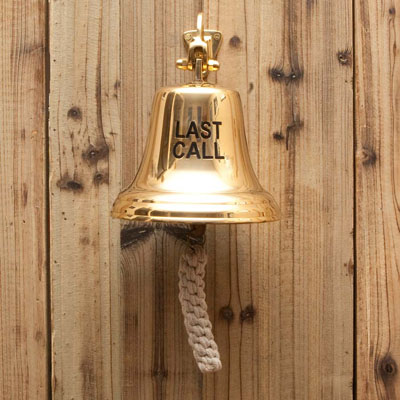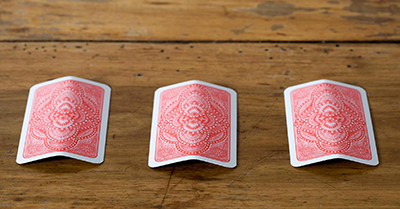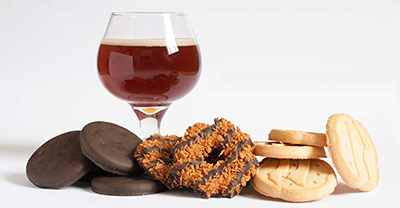Blog
4 A.M. Last Call Bill Stalls, Opponents Rallying
 One by one, Californians are raising their voices to oppose SB 384, Scott Wiener’s bill to strip away community last-call protections. The bill, which distorts the concept of “local control” over bar closing times to appeal to big-bucks nightlife and hospitality interests, was slowly progressing through the legislature, but may have hit a roadblock. In a powerful op-ed in the Sacramento Bee, Patrick R. Krill, an attorney, advocate, and licensed drug and alcohol counselor, makes the argument that it should stay there.
One by one, Californians are raising their voices to oppose SB 384, Scott Wiener’s bill to strip away community last-call protections. The bill, which distorts the concept of “local control” over bar closing times to appeal to big-bucks nightlife and hospitality interests, was slowly progressing through the legislature, but may have hit a roadblock. In a powerful op-ed in the Sacramento Bee, Patrick R. Krill, an attorney, advocate, and licensed drug and alcohol counselor, makes the argument that it should stay there.
Mr. Krill explains that alcohol harm costs California $35 billion per year, more than any other state, even while California refuses to raise alcohol excise taxes. In addition, he points out that “the proposed legislation also seems to absurdly suggest that local communities exist in hermetically-sealed isolation from one another, and that the late-night activities in one will not have a direct effect on others. In the state with the most licensed drivers in the country, and many sprawling urban areas that contain numerous contiguous ‘communities,’ any notion that closing times for bars should be a local matter amounts to nothing more than distractive window dressing on an otherwise dubious proposal.”
Currently, the bill rests in the suspense file, after the Senate GO found that it would cost an additional $1-$2 million yearly to ABC alone over the first two years—never mind the ongoing financial hit individual communities would take in enforcement and stress to the emergency medical systems. However, the suspense file may not be enough.
“It’s good to see this bill not moving forward,” said Michael Scippa, public affairs director at Alcohol Justice, “but it needs to be stopped, turned back, and torn apart. It was an obviously bad idea from the get-go.” Alcohol Justice urges concerned California citizens to bury SB 384 and protect common-sense alcohol regulation.
TAKE ACTION to tell your CA Assembly member to make sure Sen. Wiener's bill gets bounced.
READ MORE about SB 384 backers’ soulless exploitation of the Ghost Ship victims.
Congress Abuses Tax Break Meant to Reward Responsible Wineries
 U.S. Congress likes to play three-card monte with regulations, daring its constituents to find the reckless industry giveaways that are shifted around under the surface of innocuous legislation. So it is with HR 747 the Craft Beverage Modernization and Tax Reform Act of 2017—a bill which would seem meant to give small artisans a leg up, but actually increases the number of dangerous products on the market.
U.S. Congress likes to play three-card monte with regulations, daring its constituents to find the reckless industry giveaways that are shifted around under the surface of innocuous legislation. So it is with HR 747 the Craft Beverage Modernization and Tax Reform Act of 2017—a bill which would seem meant to give small artisans a leg up, but actually increases the number of dangerous products on the market.The Craft Beverage Modernization Act is nothing new. It’s a repackaging of the a bill with the same name from 2015, which never made it out of committee. On its face, the bill drastically cuts taxes on brewers, vintners, and distillers. This alone undermines the United States’ ability to recoup alcohol-related costs through Charge for Harm legislation. However, buried in the bill is a particularly egregious red queen.
Currently, wine manufacturers enjoy a tax break if they produce wine under 14% ABV. This bill would extend that break for wine up to 16% ABV. While this is a simple change on its face, it betrays the public trust. Since the break is meant to incentive vintners to keep their alcohol content low—even though many wines are “naturally” higher—it increases the prevalence of higher alcohol wines overnight. The same “just a glass” become about 15% stronger. Moreover, this is not reducing a tax burden, it’s extending a tax break. It is taking what is essentially a reward for making products with the public good in mind, and giving it to manufacturers who make far less of an effort.
Bill co-Sponsor Ron Wyden (D-Oregon) claims that booze manufacturers “face the unfair burdens of Prohibition-era rules and taxes,” but this seems improbable since alcohol sales were entirely illegal during Prohibition. Indeed, policies like the moderate-ABV wine incentive produce no burden at all.
“The industry is already obsessed with unnecessarily high ABV products,” said Alcohol Justice Public Affairs Director Michael Scippa. “There’s no sane reason to remove an effective economic brake on this alcohol content race.”
Just like in 2015, this bill seeks to reward an industry that has done nothing to deserve it, and has no reason to change.
READ MORE about Charge for Harm.
READ MORE about pending alcohol tax legislation throughout the U.S.
Let's Not Drive Our Girl Scouts to Drink
 There are few things as iconic as a Girl Scout, just out of class, setting up her table then tantalizing passersby with a… sharp but floral double IPA. If that seems odd to most of us, a number of local bars see nothing wrong with teaming up with Scout-affiliated adults to organize “cookie pairings.” These events feature bartenders selecting brews that “pair” well with each of legendary seasonal cookies, sales of which benefit the organization renowned for encouraging leadership in young girls.
There are few things as iconic as a Girl Scout, just out of class, setting up her table then tantalizing passersby with a… sharp but floral double IPA. If that seems odd to most of us, a number of local bars see nothing wrong with teaming up with Scout-affiliated adults to organize “cookie pairings.” These events feature bartenders selecting brews that “pair” well with each of legendary seasonal cookies, sales of which benefit the organization renowned for encouraging leadership in young girls.Alcohol Justice Public Affairs Director Michael Scippa condemned the promotion. “Leadership cannot mean leading kids to beer,” he said. “You would think the adults running these bars don’t need to be told this. You’d be wrong.”
Exposure to messaging about alcohol is associated with increased drinking in youth. It’s the simple principle that underlies advertising campaigns, and Alcohol Justice places breaking these links near the top of its goals for positive change. As with other alcohol-centric philanthropic efforts, even if sellers are donating their profits, they reap the benefit of publicity and marketing. In return, their "charity" strengthens the link between being, as Girls Scouts of Northern California Senior Director Kymberly Miller put it in an interview with NBC Bay Area, “a go-getter, an innovator, a risk-taker, and a leader…” and a drinker. These bars need to know that they are not doing these girls a favor, only making it more likely they hand Big Alcohol another underage customer.
READ MORE about how the alcohol industry markets to youth.
READ MORE about LADAPA's local efforts to reduce youth exposure to alcohol advertising.
In Utah, .05 BAC Is 100% Real
 UPDATE 5/17/17 As special interests pressure the Utah legislature to reconsider the bill, Utah lawmakers stand firm on the .05 BAC limit for DUI. Nonetheless, a June special session is scheduled to address the purported "consequences" of the bill. The bill is currently expected to go into effect on December 30, 2018. READ MORE about the challenges the 0.05 bill faces.
UPDATE 5/17/17 As special interests pressure the Utah legislature to reconsider the bill, Utah lawmakers stand firm on the .05 BAC limit for DUI. Nonetheless, a June special session is scheduled to address the purported "consequences" of the bill. The bill is currently expected to go into effect on December 30, 2018. READ MORE about the challenges the 0.05 bill faces.
In a resounding victory for common sense and public health, Utah Governor Gary Herbert signed into law a bill that sets 0.05 as the BAC limit for driving under the influence, becoming the first state in the nation to dip below 0.08. Public health proponents—including Alcohol Justice and CAPA—have long maintained that 0.05 BAC limits are a necessary and common-sense measure to reign in dangerous drivers. Gov. Herbert clearly agrees. “We’re first in a lot of things,” he told Salt Lake City’s Fox outlet, “and one thing we can be first in is prioritizing highway safety.”
A 0.05 BAC is the standard across much of the developed world, providing a clear and easy to understand threshold for compromised driving. Although there is no safe alcohol level for drivers, under a 0.05 BAC law, if you have a second drink, you absolutely shouldn’t drive. This clarity dovetails well with Utah’s traditions of state control of alcohol, and sets a laudable precedent for the rest of the country. Best, it makes Big Alcohol antsy.
“Come for vacation, leave on probation!” read ads from the American Beverage Institute, arguing that the lower threshold would tamp down tourism. Gov. Herbert, however, dismissed those criticisms, noting that much of the world abides by 0.05. Indeed, it’s hard to imagine the kind of person who picks their travel destinations by how easy it is to drive drunk as an ideal tourist board target.
Utah may be the first, but it soon may be joined by Hawaii and Washington, who are also considering 0.05 BAC bills. Utah may even be beaten to the post; despite signing the bill, Gov. Herbert is considering delaying implementation of the new limit and leaving the door open for further negotiation. Alcohol Justice applauds Utah’s maverick move for public health and safety, and urges the Governor to keep the momentum going and stand strong behind his groundbreaking bill.
TAKE ACTION to tell your state leaders that POINT .05 SAVES LIVES. All states can benefit from following Utah's lead.
READ MORE about 0.05 Saves Lives.
READ MORE about bills nationwide lowering BAC limits.
More Articles ...
Help us hold Big Alcohol accountable for the harm its products cause.
| GET ACTION ALERTS AND eNEWS |
STAY CONNECTED    |
CONTACT US 24 Belvedere St. San Rafael, CA 94901 415-456-5692 |
SUPPORT US Terms of Service & Privacy Policy |


